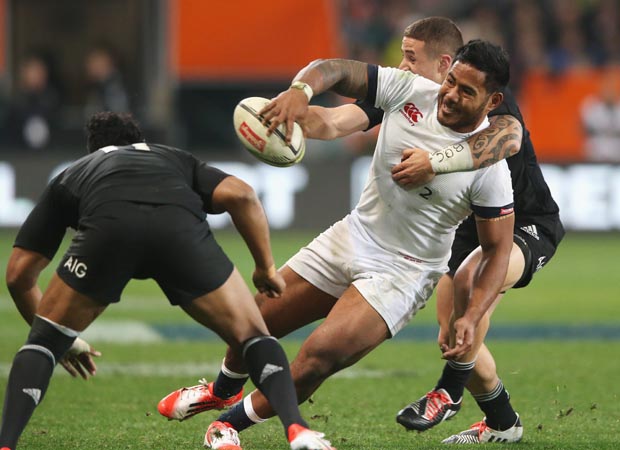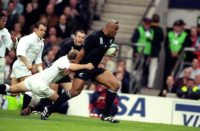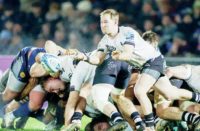 Well that's it, the tour is over but if you are a pessimist it really ended last week when the second Test was lost.
Well that's it, the tour is over but if you are a pessimist it really ended last week when the second Test was lost.
That loss by just one point flattered England and though they may have deserved it, England's last try was more or less given away by an All Blacks side knowing that had won the game, whether England scored or not.
A dismal lack of concentration after the half time break let England down badly and begs the question, what happened during the ten minute break to so dramatically alter the way that the team were playing?
From a position where the England team dominated both possession and territory for the first 40 minutes, to conceding two tries within six minutes of the start of the second half, you have to question how England's management structured the break and if that prepared the players properly for the next 40 minutes.
Yes, the All Blacks would have upped their game but that was to be expected and should be no excuse for such a drop off in form.
It could be something simple during the break like the players stiffening up, or that the management outlined the substitute strategy making those who are to be replaced either trying too hard, or relax knowing they are soon to leave the field.
It could also be the added pressure of the management team feeling they need to make slight changes to how the team trains and plays following media criticism about the team's style of play (slowing the game) in certain areas of the first Test.
That criticism obviously touched a nerve with assistant coach Graham Rowntree who felt it necessary to address the media promising that the team would ‘up the pace' in last week.
His statement, “I was alarmed by some of the comments in the press this week saying we want to slow the game down. We want to play quick because we have a lightning-fast backline and a dynamic group of forwards” would have put a little added pressure on the players, which could have contributed to the little mistakes like Danny Care twice dropping the ball at the back of the maul.
At the ‘91 World Cup the England team came in for a lot of media criticism over the style we played throughout the pool and knock-out stages to reach the final – but it was a style born out of the failure in 1990 to win the Grand Slam.
That year we played a very open attacking style, sweeping all aside until we reached the last game of that year's Five Nations Championship and still playing that open style, we lost in Scotland in the final deciding match.
The following season, Geoff Cooke decided that we had effectively ‘ran before we could walk' so it was decided to tighten things up by playing a more forward orientated game for the ‘91 Five Nations and we won a Grand Slam.
As a result of that Grand Slam (England's first in 11 years), we had discovered a style of game that enabled the team to win games on a more regular basis so training was based on that style of game going into the ‘91 World Cup.
Having reached the final playing that game, we came under a barrage of media comments, including quotes from the Australian players, saying we would never beat Australia like that and needed to open up the game to have any hope of winning.
Unfortunately some of the team, including the captain Will Carling, buckled under that pressure and changed the game for the final.
Even though we dominated playing the open attacking game in the final the Australian defence held and just like 1990, we lost.
At the start of the ‘92 season we reverted to the forward dominated game that we knew well as a squad and duly won another Grand Slam at a canter.
The moral of the story is a simple one, if your game plan is working don't change it just because of media or any other criticism, because at the end of the day history only records the result, win or lose, not how you played and that is something that a confident England management should know and preach to the players.
Tom Wood was right to say that he was fed up with having to explain away losses in last week's Rugby Paper. As a player, once you get over the initial disappointment or elation of losing or winning, you analyse the game in greater detail (I used to watch the game the following day about four times) to see what, if anything, we could have done better before the management have a chance to dissect and digest the anatomy of the game.
In my view there are a few things that the management should have improved in terms of selection and substitutions. First, despite the positive spin prior to the game, the Tuilagi wing experiment didn't work, partly because he was not bought into play often enough, either on his wing or through the middle. Manu is a physical player who draws defenders creating space for the players around him – he is not a speed merchant who finishes the move.
Interestingly, the substitutions were made just before New Zealand scored their tries which would tend to indicate in my opinion they failed to make the impact hoped for and in fact detracted from the team focus that was so precise in the first half.
Those calls are down to the management and they must take responsibility if the timing is proved wrong and not fall back on the much used ‘missed opportunities'.
Stuart Lancaster's mantra that England are improving is true but those improvements need to take England to the level that counts and what counts is winning games against the big boys down south on a regular basis, home or away.



























